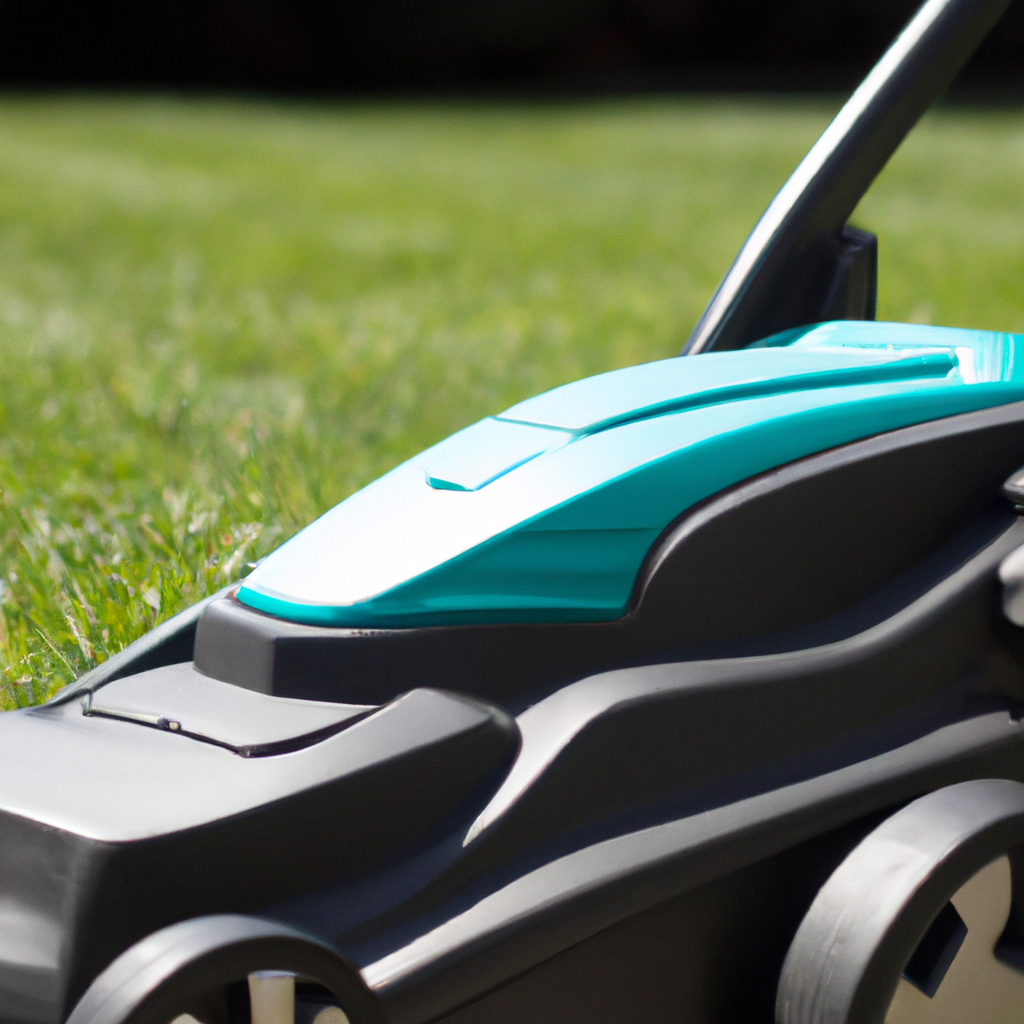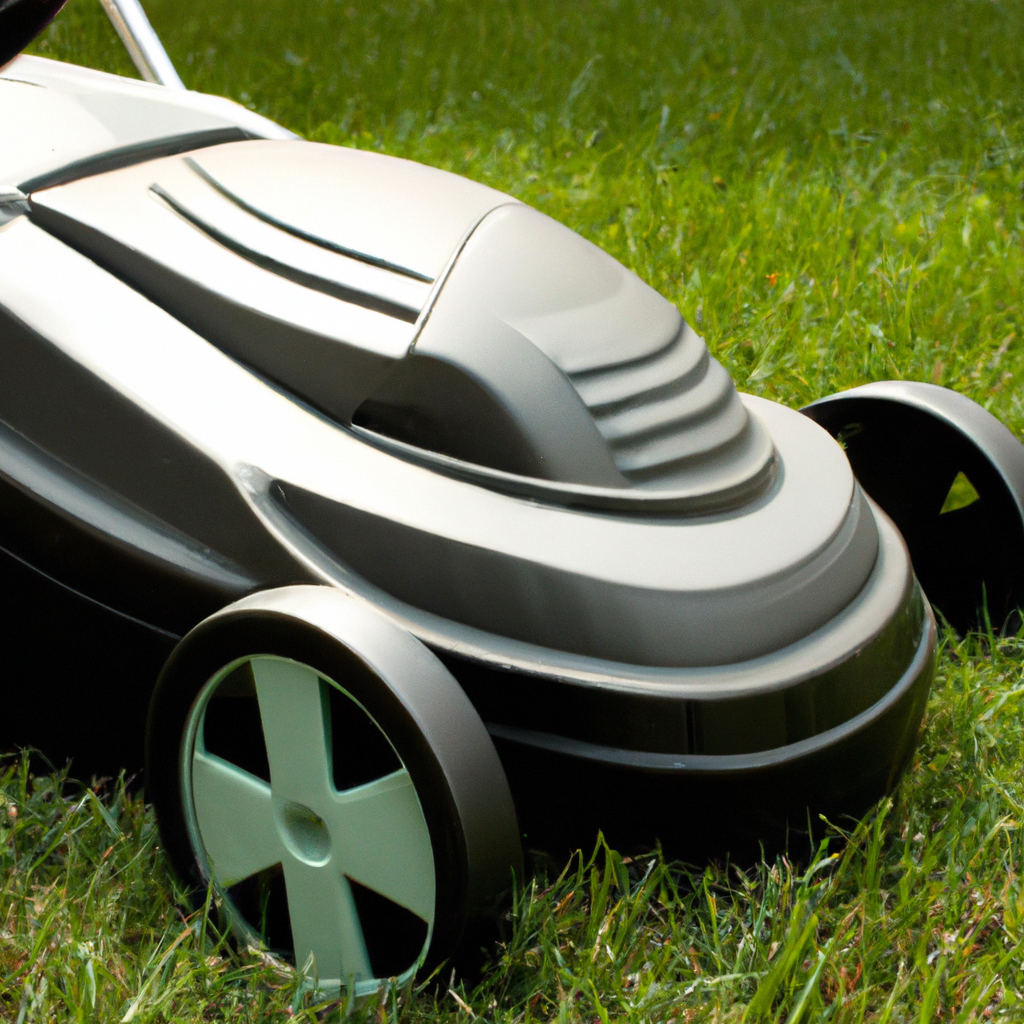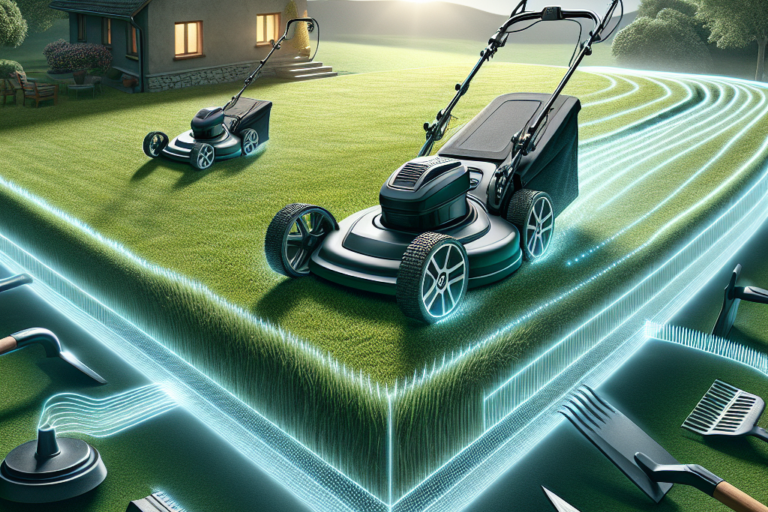In the quest for a greener and more sustainable lifestyle, many homeowners are starting to question the environmental impact of their everyday activities. One such activity that often goes unnoticed is lawn maintenance. While gasoline-powered lawn mowers have been the go-to choice for years, an increasing number of people are now considering electric lawn mowers as a more eco-friendly alternative. But are they really as eco-friendly as they seem? In this article, we will explore the environmental benefits and drawbacks of electric lawn mowers, helping you make an informed decision for a greener tomorrow.

Electric lawn mowers vs. traditional lawn mowers
When it comes to maintaining a beautiful, well-groomed lawn, choosing the right mower is essential. Electric lawn mowers have gained popularity in recent years due to their eco-friendliness and efficiency compared to traditional gas-powered mowers. In this article, we will compare electric lawn mowers with traditional lawn mowers in terms of pollution levels, energy consumption, noise levels, and maintenance requirements.
Comparison of pollution levels
One of the biggest advantages of electric lawn mowers is their significantly lower pollution levels compared to their gas-powered counterparts. Traditional mowers emit harmful pollutants such as carbon monoxide, nitrogen oxides, and volatile organic compounds (VOCs) into the air. These pollutants contribute to air pollution and can have negative impacts on human health and the environment. On the other hand, electric mowers produce zero emissions during operation, making them a much cleaner choice for your lawn care needs.
Energy consumption comparison
Electric lawn mowers are not only cleaner in terms of emissions, but they are also more energy-efficient compared to traditional mowers. Gas-powered mowers rely on fossil fuels for their operation, which not only contributes to air pollution but also consumes valuable non-renewable resources. Electric mowers, on the other hand, use electricity, which can be sourced from renewable energy sources, making them a greener option. Additionally, advancements in battery technology have further improved the energy efficiency of electric mowers, allowing for longer runtimes and reduced energy consumption.
Noise level comparison
One of the noticeable differences between electric and traditional mowers is the noise they produce. Gas-powered mowers are notorious for their loud and disruptive noise levels, which can lead to noise pollution, disturb the peace in your neighborhood, and even cause hearing damage if proper ear protection is not used. Electric mowers, on the other hand, operate much quieter, allowing you to mow your lawn without disturbing others or causing discomfort. This makes them especially ideal for early morning or late evening lawn care sessions.
Maintenance comparison
When it comes to maintenance requirements, electric lawn mowers have a clear advantage over traditional ones. Gas-powered mowers require regular maintenance such as oil changes, spark plug replacement, and air filter cleaning. In contrast, electric mowers have fewer moving parts and require minimal maintenance. They do not require oil changes or spark plug replacements, saving you time and money in the long run. Additionally, with electric mowers, you don’t have to worry about gasoline spills or the hassle of storing and handling flammable fuels.
Environmental impact of electric lawn mowers
Reduced air pollution
As mentioned earlier, electric mowers produce zero emissions during operation. This means that they do not contribute to air pollution, reducing the levels of harmful pollutants in the environment. By choosing electric over gas-powered mowers, you can play a part in improving air quality and reducing respiratory health issues caused by air pollution.
Lower carbon footprint
Electric mowers have a significantly lower carbon footprint compared to traditional mowers. Carbon dioxide (CO2) emissions from gas-powered mowers contribute to climate change and global warming. By opting for an electric mower, you can help reduce greenhouse gas emissions and mitigate the impacts of climate change. This is particularly important considering the increasing urgency to transition towards clean and renewable energy sources.
Less noise pollution
In addition to reducing air pollution, electric mowers also contribute to a quieter and more peaceful environment by reducing noise pollution. High noise levels can negatively impact wildlife, disrupt communities, and even affect the mental well-being of individuals. By using an electric mower, you can enjoy the serenity of your lawn without disturbing the natural soundscape or causing discomfort to yourself and your neighbors.
Reduction in fuel spillage
Traditional mowers rely on gasoline, which poses the risk of fuel spillage during refueling or accidental leaks. Gasoline spills can contaminate soil and water, posing a threat to plants, animals, and aquatic ecosystems. With electric mowers, there is no need for fuel storage or refueling, eliminating the risk of fuel spills and minimizing the potential harm to the environment.
Benefits of using electric lawn mowers
Zero emissions
The most significant benefit of using electric mowers is their zero emissions. By running on electricity, they produce no exhaust fumes or harmful pollutants during operation. This not only improves air quality but also reduces your carbon footprint and helps combat climate change. Choosing an electric mower is a small yet impactful step towards creating a cleaner and healthier environment.
Efficient energy use
Electric mowers are known for their energy efficiency. Unlike gas-powered mowers that burn fuel even during idle periods, electric mowers only consume energy when actively cutting the grass. This means greater efficiency and less wasted energy, ultimately leading to lower energy consumption and electricity bills. Additionally, advancements in battery technology have improved the efficiency and longevity of electric mowers, allowing for longer runtime on a single charge.
Improved air quality
With zero emissions, electric mowers contribute to improved air quality in your surroundings. By eliminating the release of harmful pollutants into the air, you can ensure that your lawn care activities have a minimal impact on the health of your family, your pets, and the overall environment. Breathing in cleaner air has numerous health benefits and can significantly enhance your quality of life.
Quieter operation
Electric mowers operate with considerably less noise compared to gas-powered mowers. The absence of loud combustion engines results in a quieter mowing experience, allowing you to work in peace without disturbing your neighbors or disrupting the tranquility of your neighborhood. This is especially important if you have young children, elderly family members, or pets who may be sensitive to loud noises.
Lower maintenance requirements
Electric mowers require less maintenance compared to their gas-powered counterparts. With no need for oil changes, spark plug replacements, or air filter cleanings, you can save time and money on maintenance tasks. Electric mowers also eliminate the hassle of dealing with gasoline, avoiding potential fuel spills, and reducing the risk of fuel system clogs or engine damage caused by stale fuel.
Battery-powered electric mowers
Advantages of battery-powered mowers
Battery-powered electric mowers offer several advantages over corded electric mowers. They provide greater mobility and freedom of movement since you are not limited by the length of an extension cord. Battery-powered mowers are also quieter since they do not require a constant power supply from an outlet. Additionally, advancements in battery technology have improved their runtime, allowing for longer periods of uninterrupted mowing.
Disadvantages of battery-powered mowers
While battery-powered mowers offer convenience and flexibility, they do have a few disadvantages. The main limitation is the runtime of the battery. Depending on the model and battery capacity, you may need to plan the mowing session accordingly or have a spare battery on hand for larger yards. Battery-powered mowers also tend to be more expensive upfront compared to corded electric mowers.
Environmental impact of batteries
Batteries play a crucial role in powering electric mowers, but it’s important to consider their environmental impact as well. Most electric mower batteries are rechargeable and have a long lifespan, reducing the need for frequent replacements. However, when the time comes to dispose of the battery, it should be done responsibly by recycling or proper disposal methods to prevent pollution and ensure the recovery of valuable materials.
Battery life and disposal
Battery life varies depending on the brand and model of the electric mower. It’s important to consider the battery capacity and runtime when choosing a battery-powered mower to ensure it can meet your lawn care needs. When a battery reaches the end of its lifespan, it should not be thrown in the regular trash. Instead, it should be recycled or disposed of at designated battery recycling centers to minimize environmental impact and promote resource conservation.

Corded electric mowers
Advantages of corded mowers
Corded electric mowers offer their own set of advantages. One major advantage is their unlimited runtime since they are constantly connected to a power source. This makes them ideal for larger yards or areas where extended mowing time is required. Corded mowers are also generally less expensive compared to battery-powered mowers, making them a budget-friendly option.
Disadvantages of corded mowers
The main disadvantage of corded mowers is their limited mobility due to the need for an extension cord. The length of the extension cord determines how far you can mow, and it may require extra planning and setup to ensure that the cord does not get tangled or pose a tripping hazard. Additionally, the constant need for a power source limits the maneuverability of corded mowers compared to their battery-powered counterparts, especially around obstacles such as trees or flower beds.
Importance of using a properly sized extension cord
When using a corded electric mower, it is crucial to use an appropriately sized extension cord. Using an extension cord that is too long or too thin can result in voltage drop, which negatively affects the mower’s performance. It is recommended to consult the manufacturer’s guidelines to determine the correct cord length and gauge for optimal performance and safety. Using the right extension cord will ensure that your corded mower operates efficiently and without any electrical hazards.
Charging and electricity sources
Using renewable energy sources
To further enhance the eco-friendliness of electric mowers, consider powering them with electricity from renewable energy sources. By using solar panels or wind turbines to generate electricity, you can minimize your reliance on conventional power grids and reduce the environmental impact associated with energy generation. Generating clean, renewable energy to charge your electric mower aligns with sustainable living practices and contributes to a greener future.
Impact of electricity generation on eco-friendliness
While electric mowers themselves do not produce emissions, it’s important to consider the source of electricity used to charge the mower. In regions where the electricity grid relies heavily on fossil fuels, the overall eco-friendliness of electric mowers may be somewhat diminished. However, as more power grids shift towards renewable energy sources, the environmental impact of charging electric mowers will continue to decrease. Choosing to charge your mower with energy from renewable sources can play a part in supporting the transition towards a cleaner and more sustainable energy future.

Considerations for eco-friendly lawn care
Proper lawn maintenance practices
In addition to choosing an electric mower, adopting proper lawn maintenance practices can further enhance the eco-friendliness of your lawn care routine. This includes regularly mowing at the appropriate height and frequency to promote healthy grass growth, aerating the soil to improve water absorption and minimize runoff, and using grass clippings as natural mulch instead of bagging and disposing of them.
Use of organic fertilizers
Another way to make your lawn care routine more eco-friendly is by using organic fertilizers. Chemical fertilizers may contain harmful synthetic ingredients that can leach into the soil and water bodies, negatively impacting ecosystems. Organic fertilizers, on the other hand, consist of natural ingredients that are safe for the environment and promote long-term soil health. They provide essential nutrients to your lawn without the risk of pollution or harm to beneficial organisms.
Reducing lawn size
Consider reducing the size of your lawn to minimize the use of resources such as water, fertilizer, and energy. By incorporating low-maintenance alternatives such as native plants, drought-tolerant grasses, or creating pollinator-friendly gardens, you can create a more sustainable and diverse landscape. A smaller lawn also means less mowing time and less energy consumption, further reducing your environmental footprint.
Mulching grass clippings
Instead of bagging and disposing of grass clippings, opt for mulching them back into the lawn. Grass clippings contain valuable nutrients that can enrich the soil and promote healthy grass growth. Mulching also helps retain moisture in the soil, reducing the need for additional irrigation. By practicing grass clippings mulching, you not only minimize waste but also contribute to a more sustainable and lush lawn.
The importance of proper mower maintenance
Regular blade sharpening
Proper mower maintenance plays a crucial role in ensuring the longevity and performance of your electric mower. One essential maintenance task is regular blade sharpening. Dull blades can tear grass instead of cutting it cleanly, leading to an uneven lawn surface and increased risk of disease. Sharpening the blades at least once per mowing season will help maintain a healthy lawn and ensure a clean, precise cut.
Cleaning and lubrication
Regular cleaning and lubrication of your electric mower are important to keep it in optimal condition. Remove any grass clippings, dirt, or debris from the cutting deck, wheels, and other parts of the mower. This helps prevent clogs and corrosion, ensuring efficient operation. Additionally, lubricating moving parts such as wheels and axles will reduce friction, extend the lifespan of the mower, and ensure smooth operation.
Battery maintenance
If you have a battery-powered electric mower, proper battery maintenance is crucial to maximize its lifespan and performance. Follow the manufacturer’s guidelines for charging and storage to ensure the battery remains in good condition. Avoid overcharging or fully depleting the battery, as this can shorten its overall lifespan. Additionally, store the battery in a cool and dry place when not in use to prevent damage.
Responsible disposal of old mowers
When it is time to retire your old mower, it is important to dispose of it responsibly. Many mower manufacturers and retailers offer take-back programs or recycling options for old mowers. Take advantage of these opportunities to ensure proper disposal and recycling of the mower components. Recycling allows for the recovery of valuable materials and reduces landfill waste, making it an environmentally responsible choice.

Common misconceptions about electric mowers
Limited power and performance
One common misconception about electric mowers is that they lack power and performance compared to gas-powered mowers. However, advancements in electric mower technology have led to increased power and improved cutting capabilities. Modern electric mowers are designed to handle various grass types and terrain, delivering results comparable to their gas-powered counterparts. With proper maintenance and the right model for your needs, an electric mower can provide reliable and efficient performance.
Higher upfront costs
While electric mowers may have a higher upfront cost compared to traditional mowers, it’s important to consider the long-term savings they offer. Electric mowers eliminate the need for fuel, oil changes, and spark plug replacements, reducing ongoing operating costs. Additionally, the longer lifespan of electric mowers compared to gas-powered mowers means you won’t need to replace them as frequently. When looking at the overall cost of ownership, electric mowers can prove to be a cost-effective choice in the long run.
Limited runtime
Battery-powered electric mowers are often perceived as having limited runtime, which can be a concern for larger yards. While it is true that battery life varies depending on the model and battery capacity, advancements in battery technology have significantly extended runtime. Many electric mowers now offer longer runtimes, allowing you to cover larger areas without the need for frequent recharging. Additionally, some models offer the option of interchangeable batteries, providing extended runtime for larger properties.
Complexity of use
Some people are hesitant to switch to electric mowers due to concerns about complexity and unfamiliarity with the technology. However, electric mowers are designed to be user-friendly and straightforward to operate. They feature simple start-up mechanisms, intuitive controls, and often require less effort to start compared to gas-powered mowers. With minimal maintenance requirements and fewer components to worry about, electric mowers offer a hassle-free and convenient lawn care experience.
Conclusion
In conclusion, electric lawn mowers offer numerous advantages over traditional mowers in terms of eco-friendliness and efficiency. They significantly reduce pollution levels, lower your carbon footprint, minimize noise pollution, and reduce maintenance requirements. Battery-powered electric mowers provide mobility and the freedom to move around without the limitations of cords, while corded electric mowers offer unlimited runtime and budget-friendly options. By charging electric mowers with renewable energy, you can further enhance their environmental benefits.
When it comes to maintaining an eco-friendly lawn, it is important to adopt proper lawn care practices, use organic fertilizers, reduce lawn size, and mulch grass clippings. Regular maintenance of your mower, including blade sharpening, cleaning, and lubrication, ensures optimal performance and extends its lifespan. By understanding and debunking common misconceptions about electric mowers, you can confidently make the switch to a greener and more sustainable lawn care routine.
With advancements in electric mower technology and the growing emphasis on environmental responsibility, choosing an electric mower is not only a good choice for your lawn but also for the planet. As more people transition to electric mowers, the demand for clean and sustainable lawn care solutions increases. Embracing electric mowers is a step towards creating a greener future and preserving the natural beauty of our surroundings.




